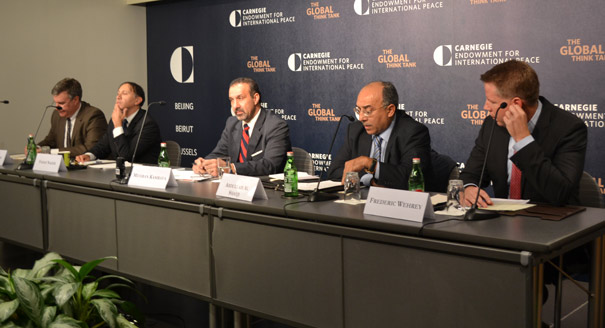{
"authors": [
"Frederic Wehrey",
"Abdullah Al Shayji",
"Gregory Gause",
"Mehran Kamrava",
"Fahad Nazer"
],
"type": "event",
"centerAffiliationAll": "dc",
"centers": [
"Carnegie Endowment for International Peace"
],
"collections": [
"Arab Awakening"
],
"englishNewsletterAll": "menaTransitions",
"nonEnglishNewsletterAll": "",
"primaryCenter": "Carnegie Endowment for International Peace",
"programAffiliation": "MEP",
"programs": [
"Middle East"
],
"projects": [],
"regions": [
"Middle East",
"Bahrain",
"Saudi Arabia",
"United Arab Emirates",
"Yemen"
],
"topics": [
"Political Reform",
"Foreign Policy"
]
}
Gulf Diplomacy in a Shifting Middle East: Continuity, Change, and Implications for the United States
Thu, October 24th, 2013
Washington, DC
Recent and dramatic developments in the Middle East have presented new challenges to the foreign policies of Saudi Arabia and the Gulf Arab states. The Egyptian military's ejection of the Morsi government, the United Nations resolution on Syria's chemical weapons, and burgeoning U.S.-Iranian dialogue have exposed sharp differences between the United States and the Gulf states over the regional order.
Gulf commentators, particularly in Saudi Arabia, are calling for more muscular and independent foreign policies to balance what they see as America's unreliability, retreat from the region, and even betrayal. Some observers forecast a new trend of Gulf unilateralism that may undercut U.S. objectives. Others see greater continuity, with only slight divergences as a form of hedging.
A panel of Gulf scholars and analysts explored current trends and likely future trajectories in the foreign policies of this strategic group of states.
Abdullah Al Shayji
Abdullah Al Shayji is professor of international relations and chairman of the political science department at Kuwait University. He is also a member of the advisory board of the committee in charge of drafting a comprehensive national security strategy for Kuwait in the Bureau of National Security and a founding member of the Gulf Research Foundation Council in Geneva. He is the author of Kuwait: Ceaseless Quest for Survival in a Hostile Environment (in Arabic) and has published academic articles in both Arabic and English on issues related to elections, the Kuwaiti parliamentary experience, democratization and the Kuwaiti National Assembly, and the external and internal factors affecting political reforms in the GCC states.
Gregory Gause
Gregory Gause is professor and department chair of political science at the University of Vermont. He focuses on international relations and Middle Eastern politics. He is the author of a number of articles and three books: The International Relations of the Persian Gulf (Cambridge University Press, 2010); Oil Monarchies: Domestic and Security Challenges in the Arab Gulf States (Council on Foreign Relations Press, 1994); and Saudi-Yemini Relations: Domestic Structures and Foreign Influence (Columbia University Press, 1990). He is a nonresident senior fellow at the Brookings Doha Center.
Mehran Kamrava
Mehran Kamrava is professor and director of the Center for International and Regional Studies at Georgetown University's School of Foreign Service in Qatar. He is the author of a number of journal articles and books, including: Qatar: Small State, Big Politics (Cornell University Press, 2013); The Modern Middle East: A Political History since the First World War (University of California Press, 2005); and Iran's Intellectual Revolution (Cambridge University Press, 2008).
Fahad Nazer
Fahad Nazer is a political analyst at JTG Inc. He was previously a political analyst at the Embassy of Saudi Arabia in Washington, DC. His writing has appeared in the New York Times, International Herald Tribune, Foreign Policy, YaleGlobal Online Magazine, and Al-Monitor, among others. His writing has also been featured by the Council on Foreign Relations and CNN, and was included in The Kingdom: Saudi Arabia and the Challenge of the 21st Century (Columbia University Press, 2009).
Frederic Wehrey
Frederic Wehrey is a senior associate in the Carnegie Middle East Program focusing on the Persian Gulf. He is the author of Sectarian Politics in the Gulf: From the Iraq War to the Arab Uprisings (Columbia University Press, forthcoming January 2014).
Carnegie does not take institutional positions on public policy issues; the views represented herein are those of the author(s) and do not necessarily reflect the views of Carnegie, its staff, or its trustees.
Event Speakers
Frederic Wehrey is a senior fellow in the Middle East Program at the Carnegie Endowment for International Peace, where his research focuses on governance, conflict, and security in Libya, North Africa, and the Persian Gulf.
Abdullah Al Shayji
Gregory Gause
Mehran Kamrava
Fahad Nazer
